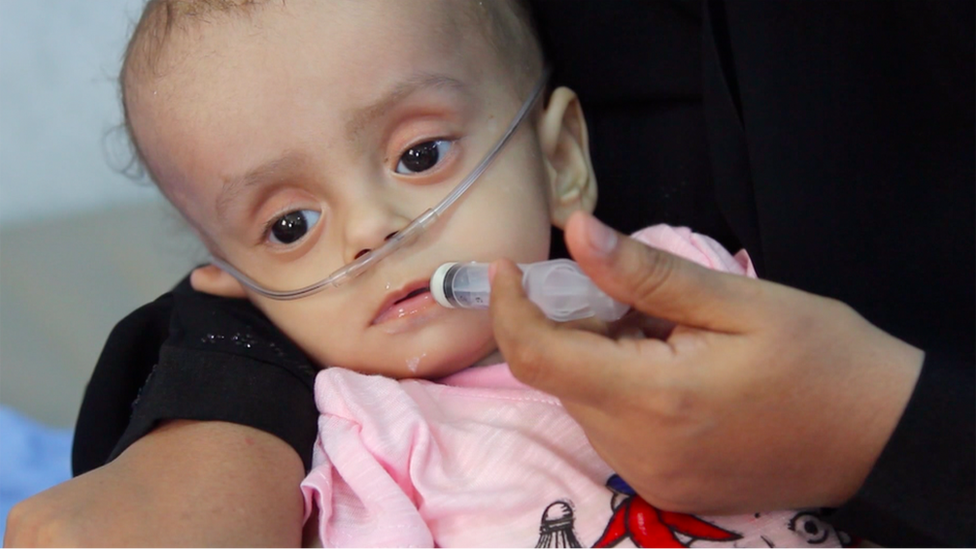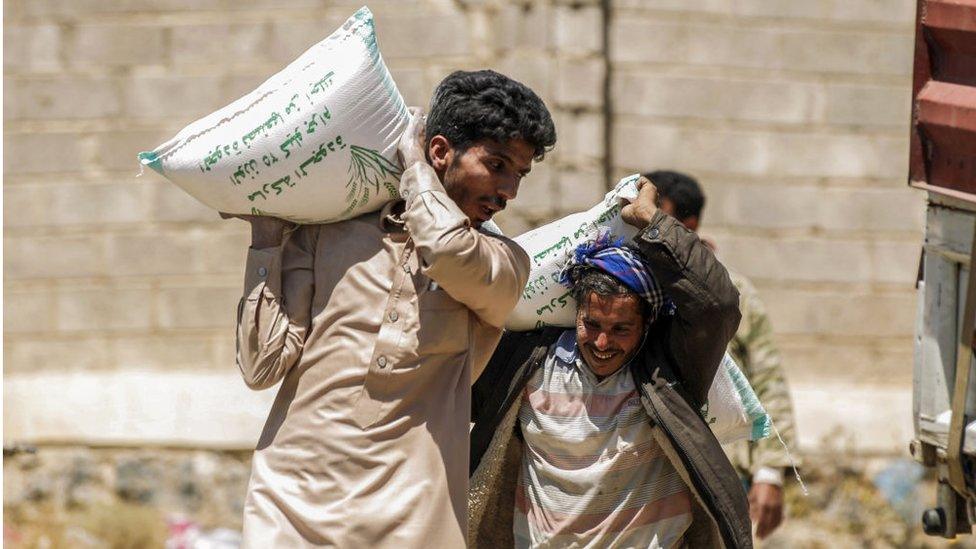Yemen aid summit seeks to pull nation from brink
- Published

A quarter of Yemen's population urgently needs help, the UN says
A pledging conference to raise funds for Yemen is taking place in Geneva on Tuesday, amidst what the UN describes as "the world's largest humanitarian crisis".
Before the conflict between the Saudi-led coalition, supporting Yemen's government, and Houthi rebels began, Yemen was already the poorest country in the Middle East.
Now, after two years of civil war, the World Food Programme says the country is on the brink of famine.
The sheer scale of the deprivation is staggering: of Yemen's 25.6 million people, almost 19 million are in urgent need of assistance, the UN says.
Almost seven million are "severely food insecure", meaning they need food aid immediately. Two million children are acutely malnourished.
"The situation is nothing short of catastrophic," says Robert Mardini, who is director of Middle East operations for the International Committee of the Red Cross (ICRC) and has recently returned from Yemen.
"What everyone tells you is that life has become unbearable."
Funding shortfall
But despite repeated warnings about a potential disaster in Yemen, the UN's appeal for $2.1bn to bring relief is only 15% funded. Aid agencies say government ministers gathering in Geneva for the pledging conference must now commit.
"Yemen is a forgotten conflict," says Caroline Anning of Save the Children.

She believes that the focus on Syria and Iraq is starving Yemen not just of funding, but of the diplomacy needed to try to bring the war to an end, and is hopeful the conference in Geneva, external may finally bring Yemen the attention it so desperately needs.
"Anything that puts Yemen on the map and gets people thinking about not letting this conflict grind on is positive."
'Total collapse'
If governments do pledge more money for Yemen, the challenges for aid agencies will remain immense.
Save the Children would like funding specifically for education, pointing out that over two million children are not able to go to school because of the conflict.
The ICRC, which has been trying to support hospitals in Yemen, would like more attention to health care, which is said to be on the verge of total collapse.

The UN says the situation in Yemen is the largest humanitarian crisis in the world
Less than half Yemen's hospitals are functioning at all, and those that are face daily shortages of staff, medicines, and electricity.
But even with extra funding in place, there will be huge difficulties delivering aid. The key port of Hudaydah, which aid agencies describe as "a lifeline" for Yemen, is now virtually closed, due to a partial blockade by coalition forces, and the destruction of cranes in air strikes.
This means that about only 30% of the supplies Yemen needs are getting into the country at all.
The BBC's Nawal al-Maghafi visits an area of Yemen where major aid agencies can no longer operate
The ICRC has given up trying to get anything through Hudaydah, and is sending supplies through the smaller southern port of Aden.
But, points out Robert Mardini, this means "restrictions and delays" as "there are 100 checkpoints between Aden and Sanaa".
Terror of life under siege in Yemen
The UN has repeatedly called on Yemen's warring parties to keep Hudaydah open, amid fears the Saudi-led coalition may be preparing an all-out assault on the port to try to deal the rebels a major blow.
"People in Hudaydah are already on the edge of famine," says Caroline Anning. "An attack would tip them over."
Robert Mardini says the possibility of a military operation in densely populated Hudaydah "is of great concern".
Child deaths
At the pledging conference aid agencies will warn again that help cannot come quickly enough for Yemen's people, especially its children.
Unicef has calculated that a child is dying every 10 minutes from a preventable illness.
"A malnourished child is nine times more likely to die from a preventable illness than one which is properly nourished," explains Christophe Boulierac of the UN children's agency Unicef.
"We have got to raise awareness of the terrible impact this conflict is having."

As far as funding goes, the UN may find it is pushing at an open door: government ministers do not usually attend pledging conferences unless they intend to donate.
But there is another message from humanitarian workers weary of trying to patch up the devastation of conflict, and of watching children die unnecessarily.
"The international community [has to] get its act together" says Robert Mardini. "To get meaningful peace negotiations back on track, because humanitarian aid alone cannot solve the problem."